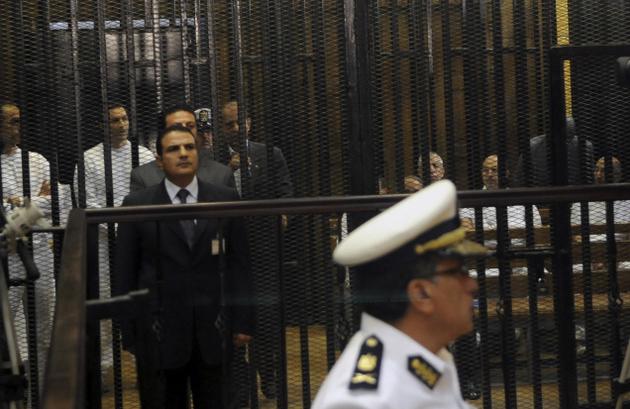
As with most things in Egypt, just when it looks like something is over, it isn’t. Last week, Egypt’s Court of Cassation ruled that ousted President Hosni Mubarak, his Interior Minister Habib al-Adly, and six of their aides would be retried.
The initial sentence, handed down last June, sentenced the defendants to 25-year life sentences for "failing to stop the killing of protesters."
While the new trial is not likely to produce harsher sentences, it has the potential to be a principled stance by the judicial system to uphold accountability for the scores of victims during last year’s revolution.
Mubarak and the other defendants will also be retried on corruption charges, of which they were previously acquitted.
Rather than bearing tangible and immediate effects, a less politicized verdict would bring about important precedents for accountability and signify a committed initiative by the judiciary to assert independence and an unbiased stance, which it has been accused of lacking throughout Egypt’s democratic transition.
The judiciary’s first ruling accused the defendants of failure to act against actions committed by "unknown elements," an important distinction from holding them responsible for the bloodshed that took place during the 18 days. The bench completely disregarded valuable information incriminating regime figures of having active roles in the decision making that led to violent crackdown of peaceful civilians. It also ignored the testimonies of hundreds of witnesses. Instead, the court took on the view of other witnesses it summoned that "foreign elements" and "hidden hands" that the former regime repeatedly blamed, were responsible for injuries and fatalities on the streets of downtown Cairo.
The Egyptian Initiative for Personal Rights (EIPR) released a report following the Court of Cassation’s ruling, recommending that new defendants be included in the retrial and that new evidence be brought to the table.
The initial Mubarak trial is a testimony to the fact that a revolution does not end when a tyrant and his accomplices step down. True change takes place when the institutions that propped that leader up for decades make serious advances to adjust to the demands of the people. Violence witnessed by the world during the 18 days and Egypt’s subsequent military rule have produced unjustifiably low levels of accountability, largely thanks to a corrupt judiciary with a vested interest in upholding unjust verdicts. Reform of the judiciary is not in the interest of those who have grown accustomed to benefitting from corrupt practices.
However, the decision to retry Mubarak was welcomed not only by organizations like EIPR, but also by Mubarak’s own supporters, in the hopes that he would be released from prison following an innocent verdict.
As the EIPR indicated, "If we want to bring those who oppressed and wronged the people to justice, there must be a genuine revolution in the criminal justice system." Of course, fair trial that seeks to examine all evidence relating to the charges won’t bring about immediate change in the judiciary and regain the people’s trust in the institution. However it’s an extremely critical step for a branch of government that must exhibit true change if the revolution is truly expected to succeed.
The judiciary isn’t the only party that could stand to benefit from a new verdict. Morsi’s government is facing harsh criticism amid a rapidly deteriorating situation in Egypt. Members of the opposition are placing the blame for a train accident that left at least 19 dead, and hundreds injured, just months after a similar accident claimed the lives of over 50 school children. Buildings have collapsed in Alexandria and Daqalihya, as Egypt’s infrastructure buckles under the weight of years of Mubarak-era corruption. With a fast-worsening economic crisis and a general sense of anger towards the president and the Muslim Brotherhood, the ability to bring about true accountability, which has been sorely lacking in the past two years, could go a long way to grant the government a little bit of good will among the people.
With new evidence presented by a fact-finding commission, a verdict holding the former ruler accountable would play into Morsi’s characterization of his presidency – portraying himself as the ‘revolution’s’ candidate. It is, however, a risky gamble, re-opening a wound that was never given the chance to heal, if another less-than satisfactory verdict is returned.
Basil El-Dabh is a reporter for Daily News Egypt. He graduated from Georgetown University with a Bachelor of Arts degree in Political Economy.
Photo: AP
Image: Mubarak%20Trial%20AP.jpg
